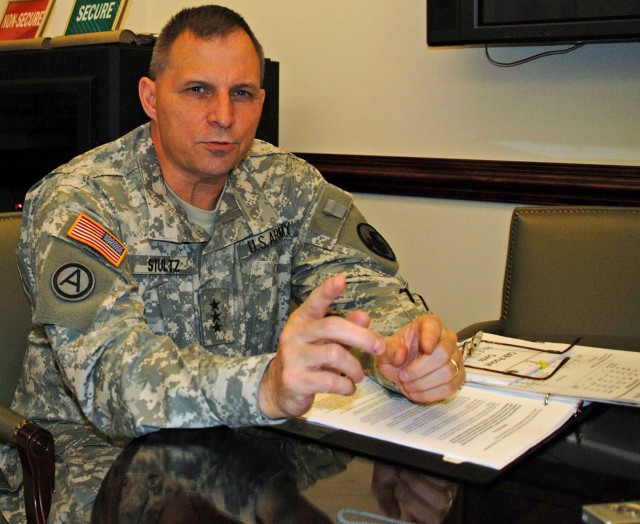WASHINGTON (Army News Service, Feb. 25, 2008) -- Transforming the Army Reserve into an "operational force" includes forging a partnership with American businesses to share not only talent -- but eventually health care, retirement plans and training as well.
"Partnership for a Shared Workforce" is the vision of Lt. Gen. Jack C. Stultz, chief of the Army Reserve, and he's pitching his plan to chambers of commerce and business forums across the country.
He wants the Army Reserve to be a preferred hiring pool for the private sector. He sees Soldiers of the future transferring back and forth seamlessly between the active component, the Army Reserve and their civilian occupations. And he sees them doing so with a continuity of health care and other benefits.
"Our biggest challenge right now is manning the force," said the former Proctor and Gamble executive who took over the reins of the Army Reserve two years ago.
Under his Army Reserve Force Generation model, known as ARFORGEN, units would deploy every four or five years. About 22,000 to 25,000 Reserve Soldiers are normally mobilized to support the war on terror, and Stultz said due to the current demand in theater, units are actually rotating now about every three or four years. New units and Army Reserve transformation should move the rotations back, he said.
Many leaders see the frequent mobilizations as a problem for employers, Stultz admitted.
"I'm trying to turn that equation around a little bit," he said.
The general has been working hard to convince companies that employing Reserve Soldiers will save them money in the long run and provide "value added" to their operations.
"If a Soldier is in the ranks of the Army Reserve, he's already been drug tested; he's already been background checked; he's already been physically tested; he's already passed an aptitude test."
Hiring Soldiers will save companies resources on security clearances and health care, Stultz said, adding that military training in leadership, team-building and technical skills also benefits employers. A number of companies are beginning to see the light, he said.
Trucking companies realize that Army Reserve drivers are often on the road 10 days straight transporting equipment from Kuwait to Iraq. They rest a day and then go on the road again. That kind of experience and stamina is valuable to big companies always seeking more drivers, Stultz said.
Cable companies would benefit from hiring Signal Soldiers who can lay fiber-optic cable.
Law enforcement agencies can never find enough qualified personnel, Stultz said, adding that the Army Reserve has a lot of Soldiers who are either military policemen or who would like to get into law enforcement.
"Let's look at the civilian skills that transfer over to Army Reserve skills," Stultz said.
Hospitals are often short x-ray technicians and can turn to Army Reserve medics and technicians to fill their positions, he said. The Army sends them to school to be x-ray technicians. When they graduate, they're certified. All hospitals need to do is put them to work, Stultz said.
"Hospitals say this is win-win," he said. "We fill their hospitals with good x-ray technicians. We just need them back every five years."
The Army Reserve and businesses share the same challenge of trying to man the force with the best recruits. Stultz said only three out of 10 of the Army's target recruiting population (males aged 17-24) actually qualify to enlist. About 40 percent can't qualify educationally or pass the aptitude test, he said. A certain percentage can't qualify morally, and a percentage can't qualify medically.
"Who is American business trying to hire' Those same three out of 10," Stultz said. "They're looking for those same individuals."
Stultz is talking to employers about sharing the cost of medical and retirement plans.
"Almost like a 401K where everybody's contributing," he said.
"When I talk to employers, that resounds. Because cost of benefits is huge to them."
He has discussed this plan with employers at chambers of commerce in New York, San Antonio, Los Angeles, Kansas City, and Washington, DC. He has met with business forums in Kansas City, Atlanta, Minneapolis and New York.
"I'm getting a lot of employers who are saying, 'you know that's not a bad idea; if we could just mine the Army Reserve as kind of a pool of potential employees, that would save a lot of time and guarantee us quality.' So we're starting to do some pilot work with employers out there who are anxious.
"That's what I see as the future: We're partnering to help American business grow economically by providing them good employees -- they're also good Soldiers."


Social Sharing